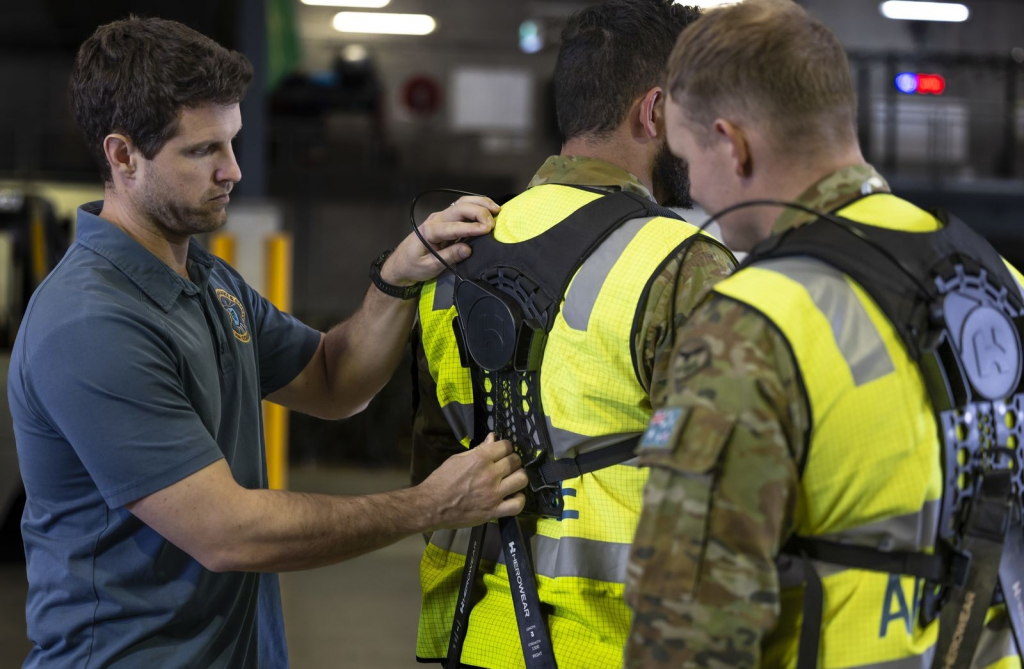
A back-relieving exosuit designed by Vanderbilt spin-off company HeroWear is continuing to show its effectiveness with the Royal Australian Air Force (RAAF) ordering hundreds of additional suits and eyeing larger expansion.
HeroWear, a Nashville-based workforce wearable technology company, was co-founded by Karl Zelik, associate professor of mechanical and biomedical engineering and physical medicine and rehabilitation, along with two other Vanderbilt alumni, Matthew Yandell and Mark Harris. Zelik also co-founded and co-directs the Center for Rehabilitation Engineering and Assistive Technology at Vanderbilt.

In 2021, Zelik’s lab received a $1.2 million investment from DEVCOM Army Research Laboratory and Army Futures Command, along with support from the Civil-Military Innovation Institute. The funding supported the Army’s Pathfinder program, a collaboration between Vanderbilt and soldiers of the 101st Airborne Division. Together, they developed the Soldier Assistive Bionic Exosuit for Resupply, or SABER, which was later commercialized by HeroWear to support service members in the U.S. and friendly foreign militaries.
Last year, HeroWear introduced its newest civilian version of the exosuit, the Apex 2. Studies show this exosuit can reduce muscle fatigue, enhance physical endurance, reduce back injuries and improve worker productivity during repetitive lifting and bending tasks, such as in manufacturing, warehousing, and military sustainment jobs. The exosuit is a wearable assist device that acts like an artificial set of back muscles, reducing back strain and fatigue by about 20-40%—using elastic mechanisms and without the need for motors or batteries. Studies show back pain is the leading cause of disability in 160 countries worldwide.
The RAAF recently ordered 470 additional Apex 2 exosuits, following previous purchases and pilot testing in 2023, to give its personnel an extra edge during their service. HeroWear’s exosuit is one of the most widely used and scientifically-validated exoskeletons in the world, and in September was voted the winner of the National Safety Council’s third annual Safety Innovation Challenge. In August, HeroWear was also named a Startup of the Year Finalist by the Nashville Entrepreneur Center as part of the NEXT Awards, which recognize entrepreneurs who are transforming industries and strengthening the Middle Tennessee community and beyond.
“The Apex 2 is a second-generation product. Many of its patented innovations came directly from advances the Vanderbilt team made during the Army Pathfinder project, and these improvements have accelerated the growth and adoption of exosuits in defense and civilian industries,” said Zelik, who is the chief scientific officer at HeroWear. “It’s exciting to see RAAF and other large organizations rolling out exosuits more broadly. We’re thrilled this technology can help people do their jobs safely and without sacrificing their bodies.”
In 2023, Zelik was recognized for his contributions to the field of biomechanics with the prestigious Goel Award from the American Society of Biomechanics. The award recognizes outstanding accomplishments in translational biomechanics research, entrepreneurship, and societal benefit.
Highlighting this achievement—and exemplifying the impact of pioneering, interdisciplinary research at Vanderbilt—HeroWear exosuits are now providing back relief to thousands of workers in over 30 countries around the world.
“This wearable technology, born from the Vanderbilt University School of Engineering, is poised to have a major impact on workplace safety and the future of physical work,” Zelik said.
Contact: Lucas Johnson, lucas.l.johnson@vanderbilt.edu